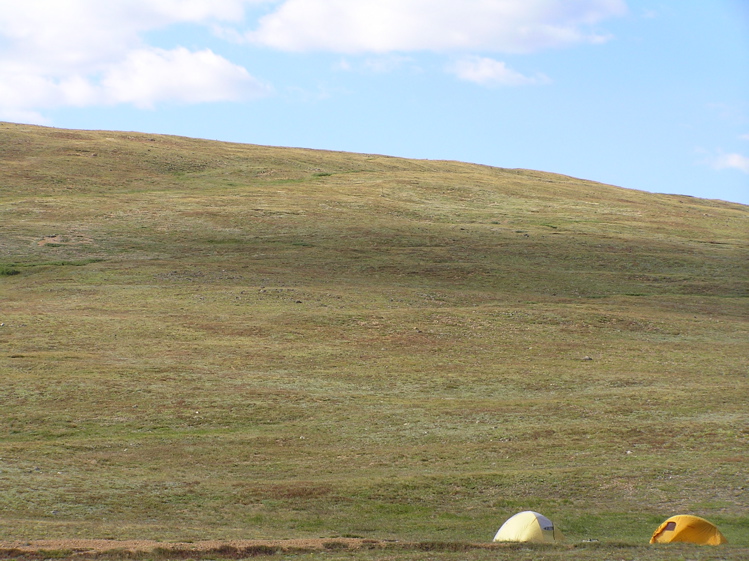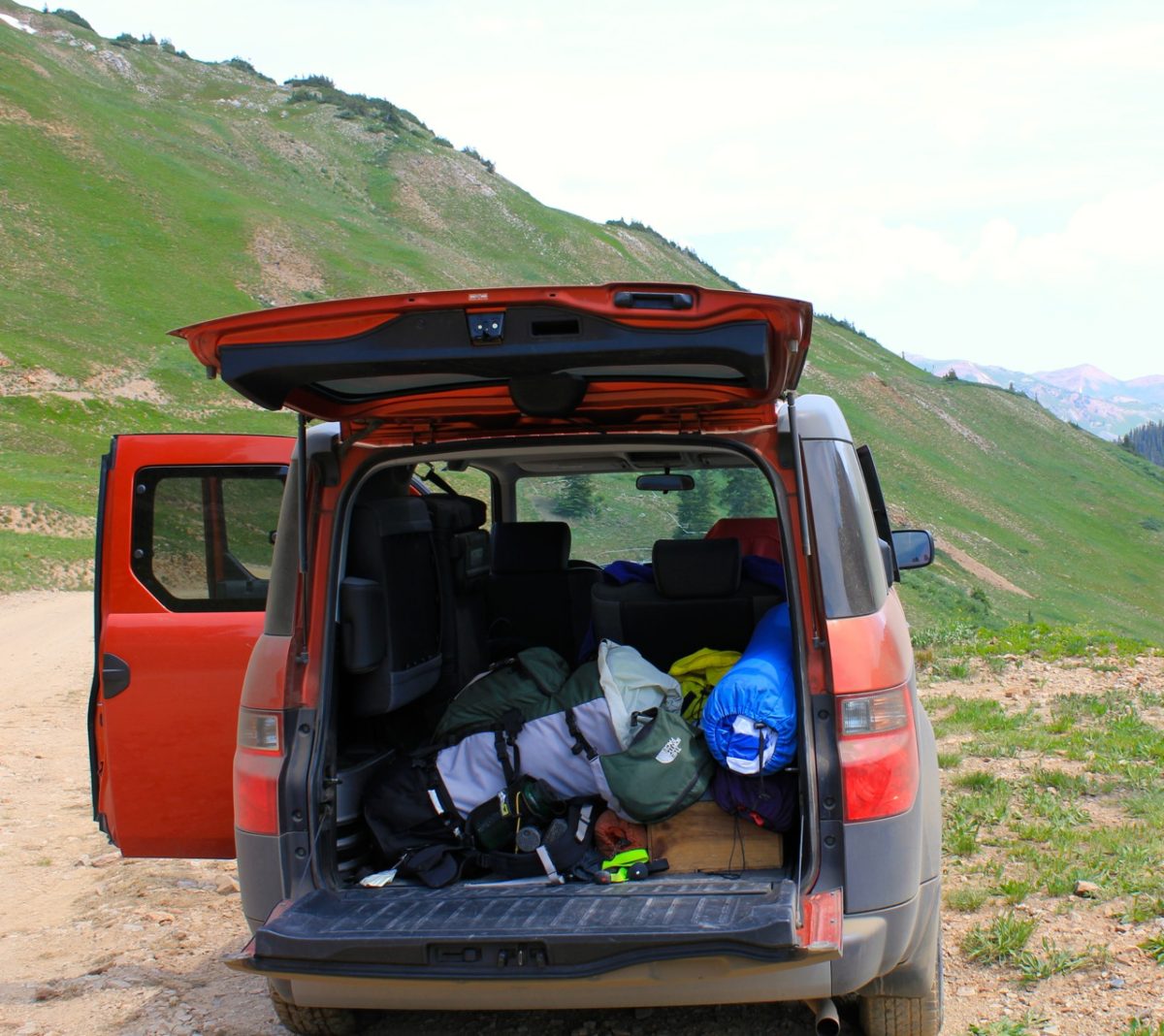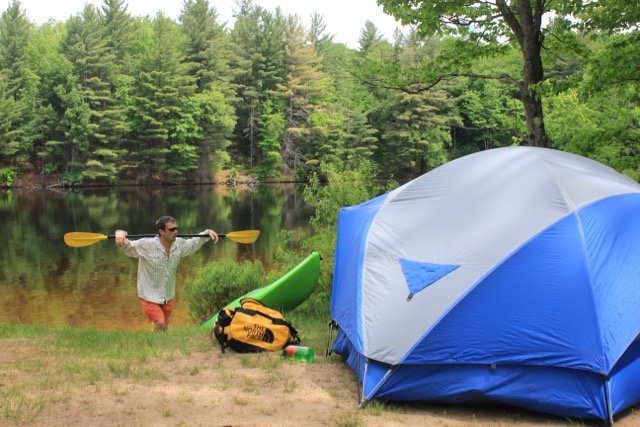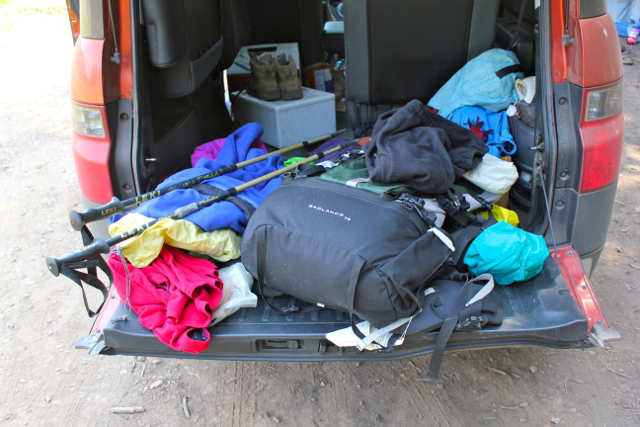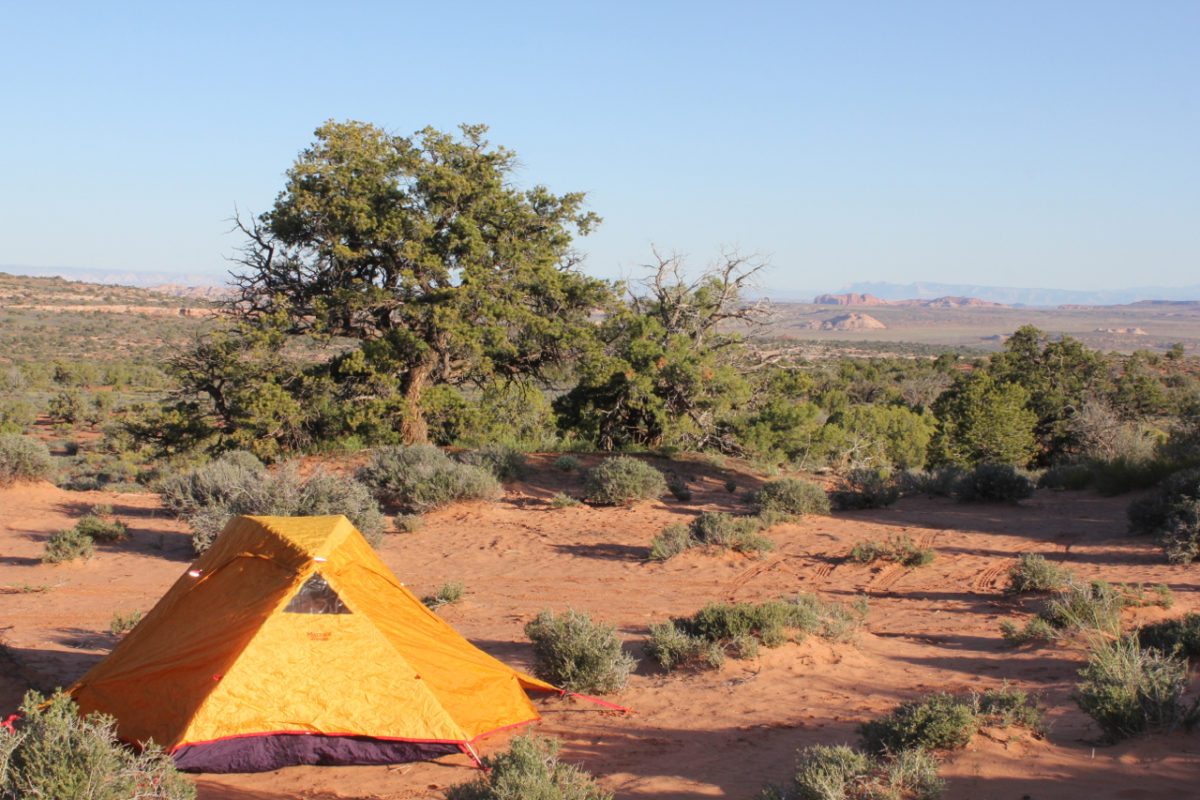After 34 days without success Dottie and Rusty Gunderson began to question their choice of location for spotting the elusive acorn woodpecker.
Tag: Camping
Rating Outdoor Company Catalogues
Rating outdoor company catalogues under the criteria “Could I camp and/or backpack with the people in their photos?”
REI Catalogue
Most of REI’s shots feature dramatic backcountry settings busy with people hiking, backpacking, tending camp stoves, and running trails. Yet all are strangely impervious to sweat, dirt, and gear imperfection. I hike but 30 feet on a trail and my ankles are splayed with mud, socks are clumped with burrs, and one of my Leki trekking poles is already two-feet shorter than the other.
Their models are also immune to emotional swings. Everyone, regardless of the activity, is smiling. I guess I’d smile too if I never had to worry about sweat and dirt.
Could I camp with them? Only if I didn’t have to share a tent. No one in REI’s pictures ever zips shut their tent flaps.
Rating: 2 north stars.
LL Bean Catalogue
The people in LL Bean’s photos resemble the types who: use multiple exclamation points in Facebook posts; own at least one shelf at home decorated with seashells and sand dollars; listen to NPR during fundraising drives; don’t get wet while washing their cars; and harbor an odd fascination with pumpkins, Labrador retrievers, and chatting on wood-planked porches while holding tote bags.
Could I camp with them? Probably not. Roughing it to these people is eating lobster without a bib. Plus, they don’t zip their tents either.
Rating: 1 north star.
Patagonia Catalogue
Patagonia is my Achilles Heel of mail ordering. I identify with the dirtbag authenticity of their photos. Plus, I relate to Yvon Chouinard’s overt environmental commitment.
Could I camp with them? Yes and no. Everyone zips their tents. But some subjects look too diehard reminding me of last year’s backpacking experience with someone who took leave no trace to the infinite-extreme. Instead of backpacking every morning felt as if we were fleeing a crime scene.
Rating: 4 north stars.
Stio Catalogue
This relative newcomer to the outdoor clothing world features photos of true outdoor junkies in true outdoor situations in and around Jackson Hole, Wyoming – mountain crags, knee-deep powder, high alpine lakes. I can relate. Totally.
Could I camp with them? No, but only on the basis of Stio’s maniacal quest to reinvent the color wheel. Teal is called ocean depths. Black is tap shoe. And gray, depending on jacket type, is either smoked pearl or Eifel Tower.
I could not camp, backpack, hike, or even whittle sticks with people who used such color descriptions. It would potentially put me at risk with the law. If I witnessed three armed bank robbers dressed in black flee in a gray SUV and described them to police as three men dressed in tap shoe driving an Eifel Tower SUV with ocean depths wheel rims I’d be arrested as an accessory.
Rating: 2 north stars
Thoughts? Comments? Other catalogues to consider? Please share.
Ski Bum, Dirt Bag & River Rat
I have a friend who is passionate about wine. If asked he could, without hesitation, pair the perfect wine for a soggy, half-eaten berry pomegranate chia-flavored Clif bar found floating in the hull of a freestyle kayak. His wine expertise prompts people to refer to him as an aficionado, a connoisseur, sophisticated.
Conversely, I’m passionate about skiing. If asked, I could, without hesitation, confidently negotiate any double black diamond slope. But my veneration of skiing does not translate into a gush of high-brow platitudes. Instead I’m called a ski bum.
Not an expert. Not an aficionado. But a bum. It makes it sound as if I spend my days panhandling for money at the base of Aspen Mountain, causing people to mutter, “Don’t give him money, he’ll only spend it on lip balm and hot cocoa.”
The late Jim Harrison once observed “A man at play in America has John Calvin tapping him on the shoulder and telling him to please be serious.” This especially applies to anyone whose outdoor gear consists of poles, paddles or packs. Only instead of a tapping on the shoulder admonishment flares in the form of pejoratives.
I also backpack and raft. Consequently, I’m also tagged as a dirt bag and a river rat.
Instead of worthy passions these sound like problems. Or code names for addictions, creating unjustified guilt, raising half-expectations of finding an intervention letter from my girlfriend taped to the refrigerator door:
Your backpacking is ruining us. Last Saturday, unbeknownst to you, I spied you in the basement secretly seam-sealing your tent. Two nights later you claimed you had to stay late at work but returned home reeking of campfire smoke. The next morning, when asked to help my daughter tie her shoes, you tied two taut-line hitches. And last night you took leave-no-trace too far when you insisted we bus and reset our table at Carrabba’s. Can’t you see how being a dirtbag is tearing us apart?
Outside of surfing (beach bum) and maybe hockey (rink rat) all other outdoor activities remain strangely immune. When I queried a friend, who works as a psychologist, about this he suggested that labels sometimes manifest when an activity becomes so encompassing it morphs into a lifestyle choice.
If so then why does my neighbor, who claims falconry as a lifestyle, remain nickname-immune? This, after all, is a person who devotes his days to making pigeons nervous. Yet everyone respectfully refers to him as a falconer. Never once have I heard, “He’s nothing but a predatory bird bum.” Or, “He’s a raptor rat.”
Or fly-fishermen? How have they escaped being besmirched? They not only fit the pole criteria, but in any given day they exceed it by also carrying packs and using paddles while donned in rubber slacks and posing with hooked trout like kids with mall Santas.
These are questions only my wine friend can answer. For, after all, by society’s standards, he is sophisticated
Have any outdoor nicknames to share?
5 Car Camping Lessons
Transitioning from backpacking to car camping is like going from a Hilton on Waikiki Beach to a Motel 6 in Gary, Indiana. Backpacking offers an embarrassment of outdoor amenities: hermetic solitude, unfettered wilderness, brain-bucking star shows. It sets all precedent for the outdoor experience. Anything less is a massive, mind-sagging disappointment.
I learned this several days ago in New York’s Allegany State Park. After spending several days backpacking in Canyonlands National Park’s Salt Creek Canyon, a remote maze that holds a trove of Anasazi ruins, I returned east to attend to family matters. During a free night I grabbed a campsite at Allegany State Park, in southwestern New York along the Pennsylvania border.
I only wanted a patch of forest to pitch my tent and use as a base for a quick hike at dusk and an early morning kayak paddle. I expected a relaxing night, but instead received the following lessons in the cold realities of today’s car camping scene.
Car Camping Lesson 1
Leave no trace does not apply to car campers. Upon pulling into campsite 17 I conducted an Allegany CSI (Camp Site Investigation) and learned that the previous tenants enjoyed Little Debbie snack cakes, read People magazine, and mistook maple syrup as a picnic table lacquering agent.
Car Camping Lesson 2
Camping trailers today are large enough to apply for statehood. The trailer that neighbored me spanned, according to the owner, 32 feet. It created the comforting aura of camping next to a strip mall with lodging options.
Car Camping Lesson 3
Roughing it for people in trailers means the trailer’s flat screen does not offer the Weather Channel in HD.
Car Camping Lesson 4
Even with the Boy Scout motto “Be prepared” firmly rutted in the mind, nothing can prepare you for the horror of spending a night camping listening to the trailer across the road play Foreigner’s Greatest hits over and over and over until 1 in the morning. The lone consolation being the sleepless hours gave me time to read the left-behind People magazine. I had no idea Taylor Swift sported a tattoo.
Car Camping Lesson 5
Maple syrup lacquered picnic tables are still sticky the next morning. Six days later and the daypack still feels like it’s coated with invisible Velcro.
Best Not to Describe Camping
While lying on the Utah desert floor cinching the sleeping bag’s hood so only my nostrils were left exposed to the sleep-denying cold, I concluded that it’s a good thing we have words for outdoor recreation otherwise we’d lose interest if we had to describe our favorite activities.
Take camping for example. The word itself conjures happy images of pitching tents along forested edges of gin-clear lakes, conversations around campfires, and monarch butterflies landing on the foreheads of small children.
If someone asks, “Want to go camping?” the outdoor-minded don’t think twice. It sounds fun. Yet, if we didn’t have a word for camping getting people outdoors would take convincing.
I would give second thought if some of my backpacking friends instead of asking “Want to go camping?” asked “Want to spend the weekend without furniture and focus every waking second to avoiding mosquitos, ticks, bears, and mountains lions?
And then at night sit around a campfire attempting to escape camp smoke that regardless of wind direction somehow defies all logic and follows your every step? And then when it comes time to call it a night sleep on wafer-thin air mattresses filled with our own foul breaths. But don’t worry about sleeping. We’ll be too bug-eyed awake from the comforting realization that even though all of our food is dangling from a sturdy branch inside a bear bag, bears also like meat, we’re the meat, and we’re on the ground.
After limited sleep we’ll rise at dawn and eat freeze-dried cheese omelettes from a foil pouch. Just before you’re about to compliment the deliciousness of the meal you or someone else will realize we forgot to remove the oxygen absorption packet from the pouch. We’ll then become obsessed with food poisoning concerns, distracting our attentions, leaving us vulnerable against mosquitoes, ticks, bears, and mountain lions.
Out of necessity we’ll then spend the afternoon collecting firewood like hapless medieval peasants. Just so we can repeat last night, with all of its discomforts and fears, all over again.
So what do you say? You in?”
I’d hesitate, but I’d be in. For what sounds like discomfort is actually the entranceway to experiences and memories. A weekend spent camping – good or bad – will perpetually bloom in the brain as a king-wow memory, forever fueling a sustaining sense of being alive.
Try saying that about a weekend spent indoors watching TV. No memories, only guilt for squandering time that can never be recovered.

